
Lungo local tour Expert Local Guides
On some Ethiopia tours we use the services of specially chosen lungo local guides who really know their subject. In addition to providing detailed relevant background information, they can also help you connect to the local way of life and culture of a destination.

Lungo local tour Ethiopia always ready to organise your holiday together with all team members. If you are coming with the big group or individual please consider the following hint to organize a perfect trip.
Lonely planet book to organise the tour to Ethiopia
Travel tours generally involve a group of people who travel together, providing a shared experience and companionship. Tours can be professionally organized or they can be as simple as a group of friends taking a trip together. To organize a tour, it is important to plan in advance, take into consideration your audience and pay attention to details.

Select a destination. Choose a destination for your tour, keeping in mind several factors: How many people will you be able to recruit to travel? Is the location suitable for large groups or will you need to take a small group. Do you have the necessary language and cultural skills, or can you hire a guide? Will the location offer activities and events to keep your group busy? Be sure to consider safety and health issues as well.
Know your tour members. To organize a successful tour, it is important to understand the people who will be traveling. Are they singles, families or couples? Will they expect to stay in luxury hotels or are they comfortable staying in hostels? By interviewing your tour participants, you can clarify their expectations and create a tour that will be acceptable for all involved.

Research requirements. As soon as possible, develop a thorough understanding of the travel requirements for your destination and be sure that your tour members meet them. Look at visas, passport dates, entry and exit fees, and any immunization requirements. Gather the necessary documentation from your tour group, and make sure that everyone is covered; nothing ruins a tour faster than trouble at the airport or in a foreign country.
Plan activities. Based on your tour group’s preferences, arrange activities. Be sure to budget in time for individual exploration. Hire a guide where necessary, and book all tickets in advance to increase the likelihood that your itinerary will be doable. Send out copies of the planned activity list to your group members, and listen carefully to any concerns they might have. Book accommodations, and include it in your communication so members can research nearby attractions.

Be in control. Once at your destination, pay attention to the mental state of your tour members. New countries and situations can be disconcerting, and if you appear to be in control, the tour group will feel more confident. Make sure to gauge their reactions, and be quick to quiet any fears; a relaxed tour group is a happy tour group.

Top 10 important suggestions before you organize the trip and during the tour
1) Proactively communicate your specific interests
to your guide or to your tour operator before you organize the trip and during the trip.
Fact: it’s impossible for your guide to read your mind and to know everything about you and your interests. When it comes to travel, passivity does not pay. This goes for independent travel and tours alike.

If you have a specific interest – ancient history, sports, local foods, markets, weaving, ceramics, music, whatever – share that interest with your guide at the beginning of your tour. Then ask your guide nicely if he can direct you to places, experiences or people that will help you learn more about your interest.
This may sound obvious, but we’re surprised by how often it does not happen.

A couple things to keep in mind when applying this approach. Understand that you are a guest – a guest in a place that is likely the guide’s home. It’s best to express your interest in the form of questions, rather than in the form of demands. If you come at your guide combatively with an “I paid for this” attitude, forget it. Instead, show your interest and humble curiosity to provide your guide with a platform to share more of his knowledge of his home country and culture with you.
To known in a good-hearted way, and position it to see if the experiences you seek may also meet the interests of others on your tour. If they don’t, then try to schedule these experiences during your free time.

We’re reminded of: one tourist told for our guide on the first day of Ethiopia tour about his deep interest in learning about Ethiopian food. Over the course of the week he took them to a rural village preparing food for a 500-person wedding, organized an impromptu cooking course at a lodge, introduced them to restaurant owners who explained their cuisine to them, and found food markets along the way that were not on the itinerary. This not only added to your experience, but to that of your fellow passengers and your guide.

2) Perform your own research.
we saw some tourist on a tour with reading always a guidebook we thought it a bit odd. I mean, you’re paying for the tour and a guide who is a local expert so why bother?
We soon saw the light.
The more research you perform on the place you are visiting – by reading a guidebook, asking friend, doing internet research – the better prepared you’ll be to ask informed questions and go off-itinerary for a bit, either by yourself or with your group. At the very least, this research can help source new restaurants or cafes to explore outside of your hotel.

3) Ask questions, channel your curiosity.
Unleash your curiosity and leverage your tour guide as the resource he is — or should be — to learn as much as you can about the place you are visiting. This will not only benefit your understanding of the local context and history, but it will also jump-start your guide’s energy and direct his knowledge and explanations more to your interests.
This is especially important to break what I call “tour monotony” where it’s clear that the guide is giving an explanation on auto-pilot. This can get boring for everyone very quickly, lungo local team guide included. Asking questions changes the pace and energy and often surfaces stories that you’ll take home and remember forever.

4) Take advantage of your free time.
Many tours incorporate free time into the itinerary — either entirely free days or chunks of time before or after scheduled visits to sites. Be sure to use these bits of free time deliberately to go off on your own and explore – perhaps to a café, market, or new street you haven’t walked down. Most often, it’s the ad hoc, unexpected experiences that not only provide real, authentic culture and context, but leave you with the “you wouldn’t believe what happened to you…!” stories that we tell our friends back home

5) Realize that you don’t have to do everything.
This is one that I struggle with. When I’m on a tour, I often feel compelled to do everything that’s offered. But sometimes the best decision is to strategically skip an optional activity or do something different so long as my choice doesn’t disrupt the group or their schedule.

6) Get outside the hotel.
As tempting as it is to stay in your hotel — it’s easy and close — push yourself to get outside to take care of basic necessities like eating, drinking and shopping. And use those journeys to find local restaurants, cafes, bars or shops. This approach forces you to engage with more local people, thereby expanding the nature of your impressions and experiences in a place.
These outings will also allow you to spread your tourism dollars to different businesses and families. Family-run businesses – particularly if you interact with the people that run them – will often provide you with a sense of connection and a handful of stories to take back home.

7) Experience the beginning of the day.
Sleep is a precious thing, and it is especially important while traveling. But as much as a good lie-in helps sometimes, so does waking up early. In fact, it’s almost always always worth the effort.
Many towns and villages around the world come to life in the early hours of the morning as vendors carry their goods to market. Morning is also a great time to see children going to school and watch the day unfold as cafes and restaurants set up for the day. This time is often less stressful for everyone, so you are more likely to have friendly, focused interactions. For example, you’re more likely to get an answer to your question of a vendor when they are just getting set up than when they are in full swing dealing with a handful of customers.
After getting your fill of activity, you can return to the hotel for breakfast or a coffee to meet the group for the rest of the day.

8) Extend your time in the country.
A tour is a great way to introduce you to a destination. It can allow you to get your bearings, find your feet, and build confidence traveling around a new country with a different language and culture. Spending some extra time after your tour allows you to explore cities or regions more deeply than might have been allowed by your tour itinerary. Alternatively, you can further explore new areas of the country.

9) Understand that alone time is OK.
Understand that you don’t have to spend all your time with the group; be sure to take care of your needs, including the need to reflect. Don’t feel bad about getting dinner on your own or going solo for your free time or tuning out when the bus is moving. It’s your holiday, after all.
Having said that, you may want to let others know that you are not shunning them, but instead are taking some time to yourself to refresh. Reasonable people will understand and most will nod in approval. In fact, some may realize they need a bit of that themselves.

10) Don’t let negative thoughts simmer to a boil.
Stuff happens. If something bothers you, tell your guide in private. Have an open conversation. His job is to try and make the trip as enjoyable as possible for everyone, within limits. It may be that he can’t solve the problem immediately, but at least he can begin to address the issue. Be sure to also give feedback to your tour provider after the tour is over so they can address issues on future trips.


